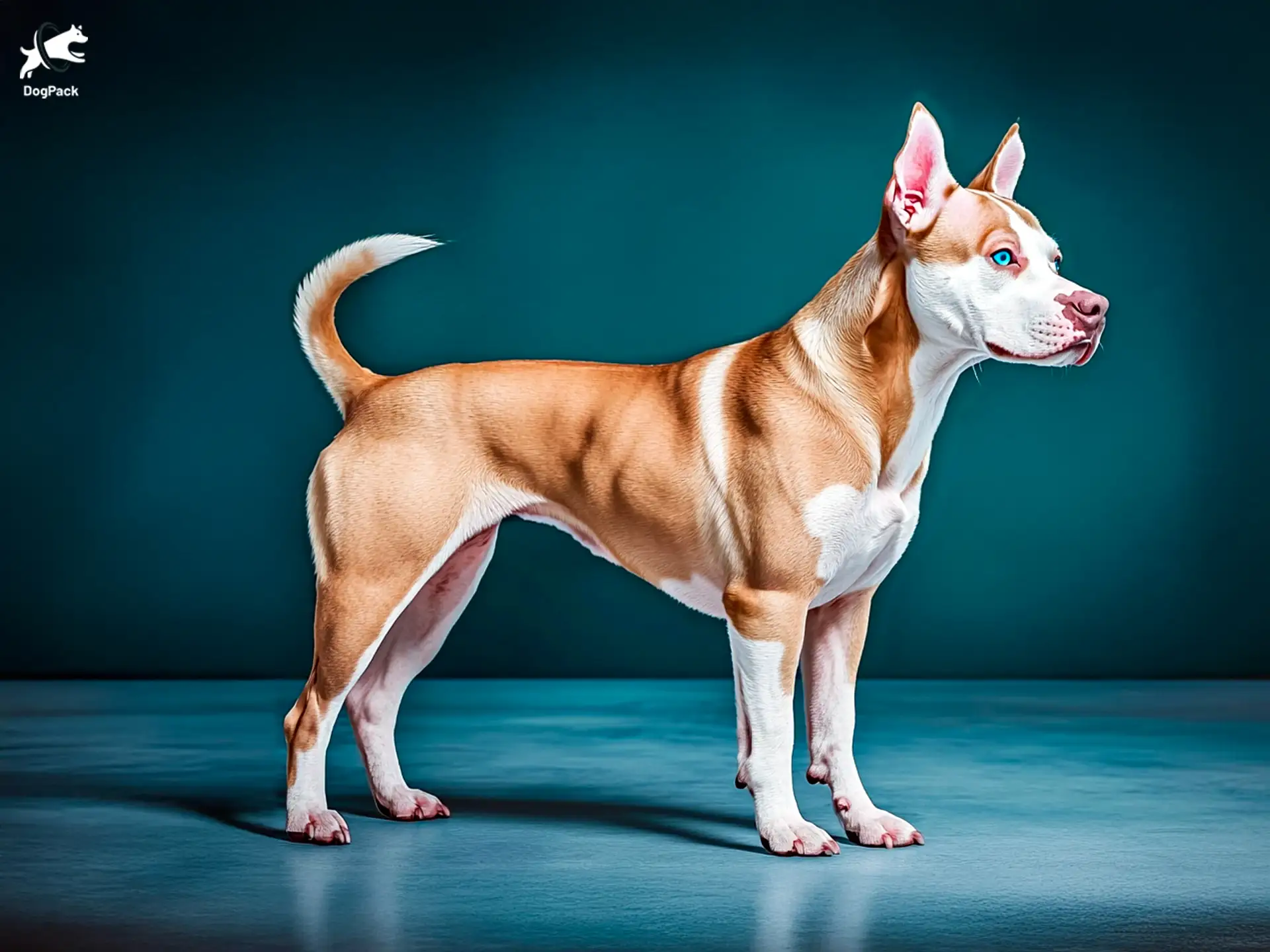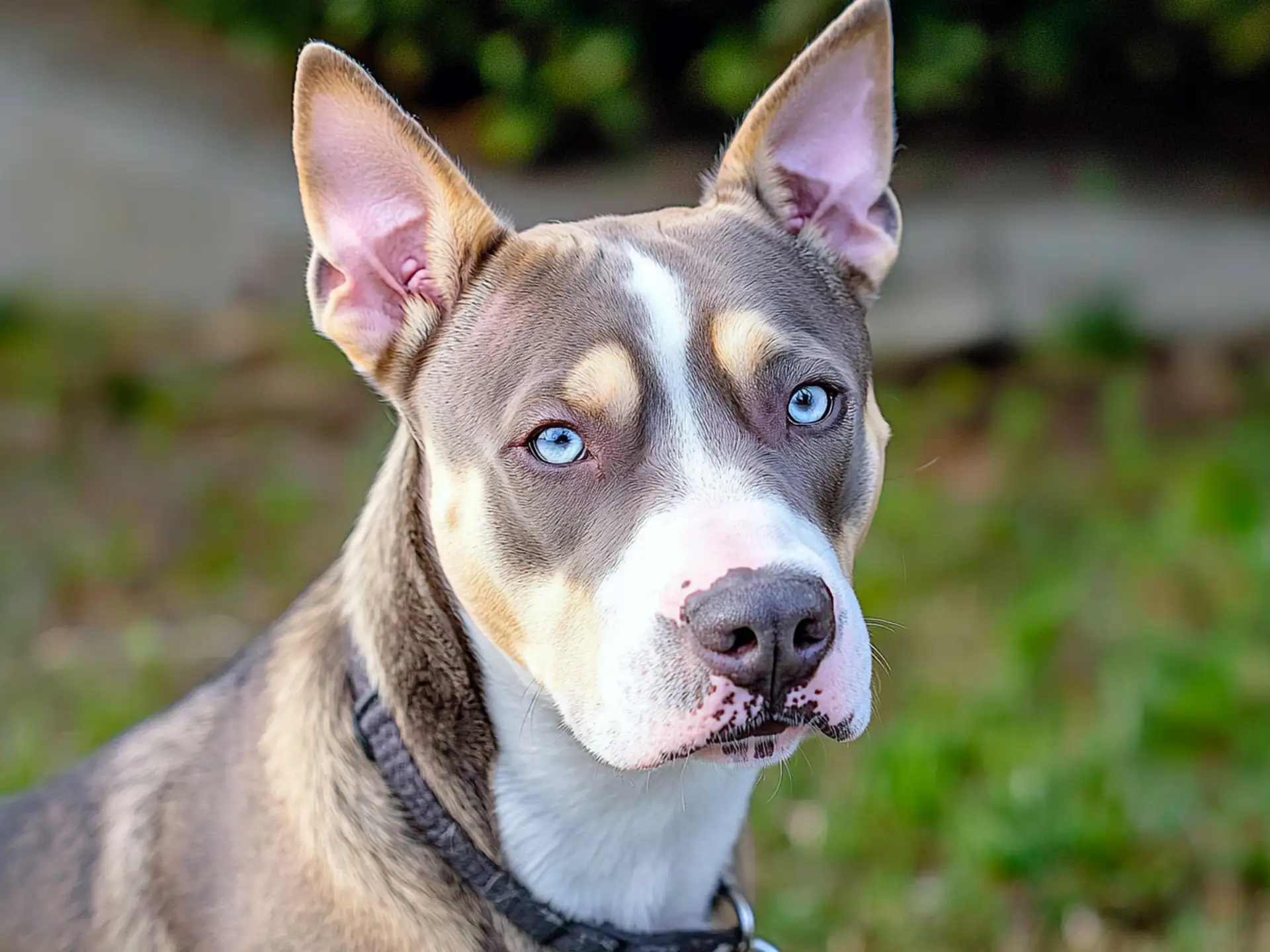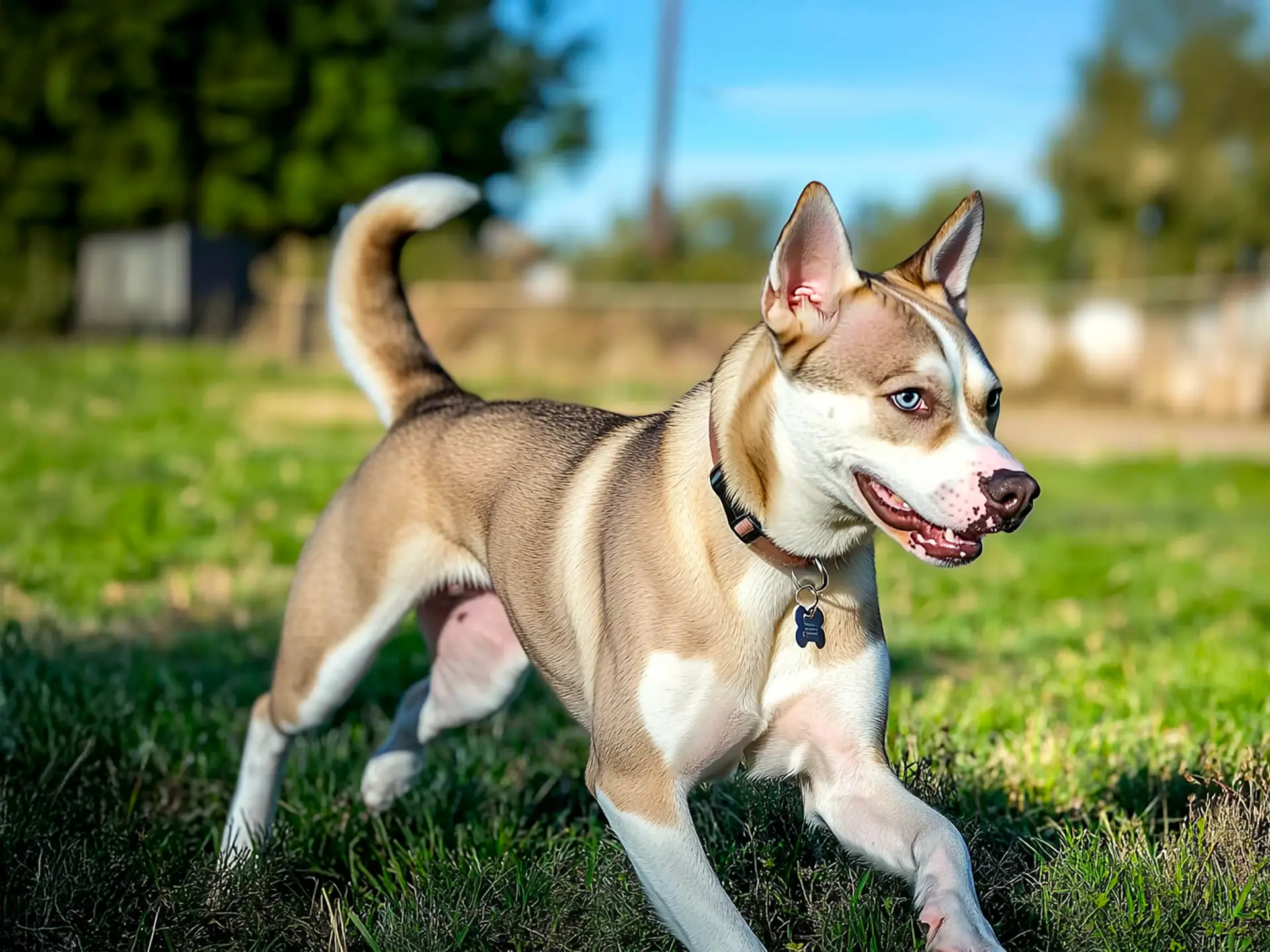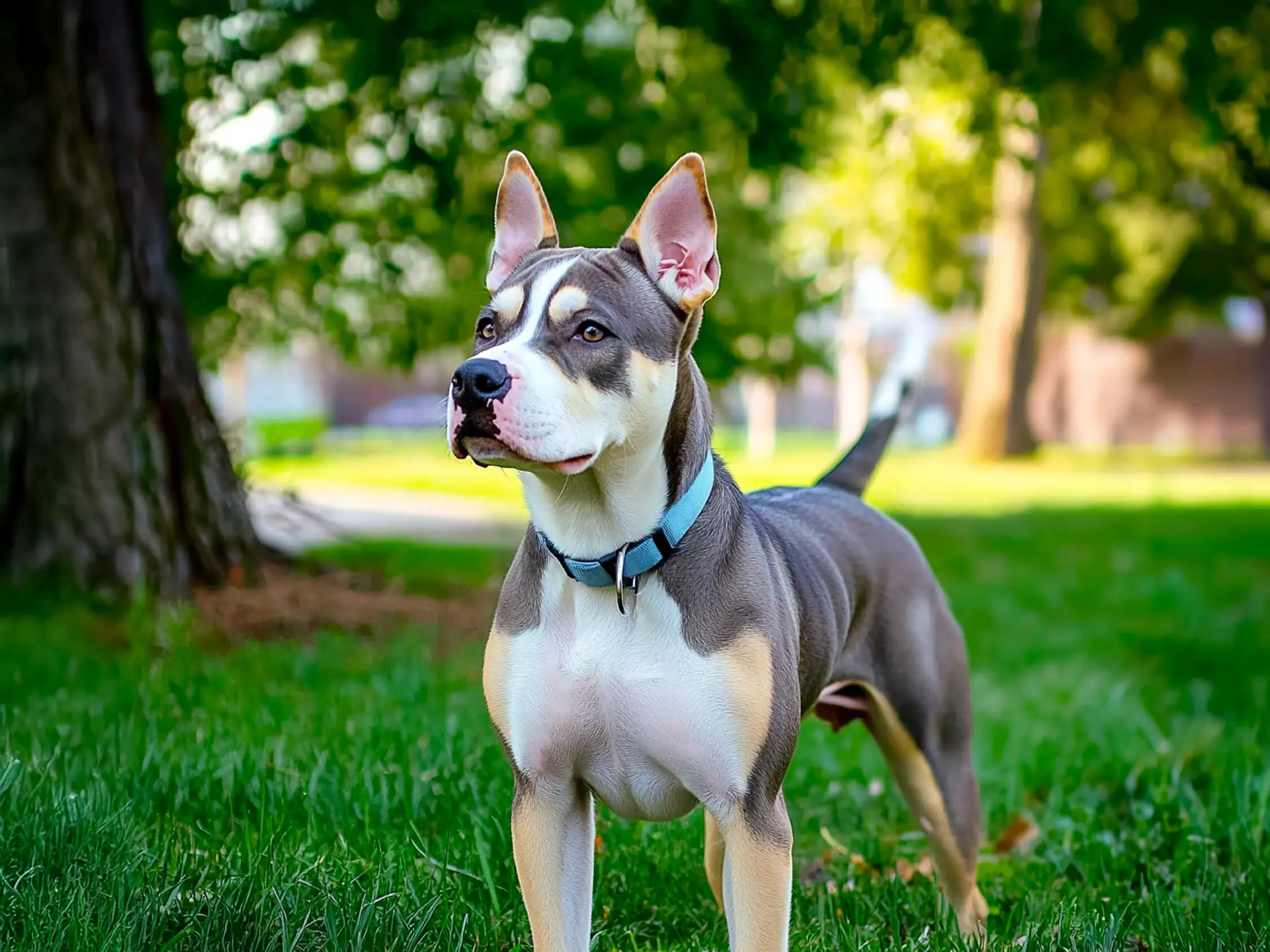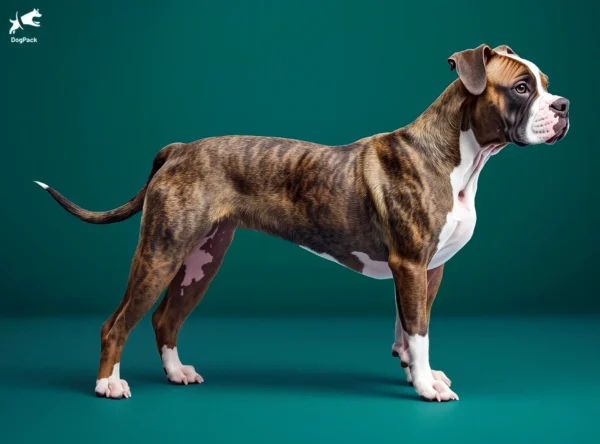Pitsky Dog Breed Info & Overview
The Pitsky, a dynamic mix of the Siberian Husky and American Pit Bull Terrier, combines the best of both breeds into a spirited and loyal companion. With the Husky’s zest for adventure and the Pit Bull’s steadfast devotion, this high-energy hybrid is perfect for active families or individuals. If you’re looking for a friend who brings excitement and affection in equal measure, the Pitsky is an ideal choice.
Characteristics
Pictures
Breed History
The Pitsky is a relatively new hybrid, first gaining popularity in the United States within the past few decades. This mix of the American Pit Bull Terrier and Siberian Husky was created to combine the athleticism, loyalty, and intelligence of both parent breeds.
While the Pitsky’s history is still unfolding, its lineage is rooted in two iconic breeds. The Siberian Husky, originally bred by the Chukchi people of Northeast Asia, is celebrated for its endurance and sled-pulling skills. The American Pit Bull Terrier, with a background in working and sporting roles, is known for its strength and devotion.
Together, these traits give the Pitsky a unique blend of working-dog energy and family-oriented loyalty. As hybrid dogs gain recognition for their versatility and character, the Pitsky has steadily risen in popularity among active families and dog enthusiasts.
Temperament, Personality
The Pitsky is a lively, affectionate, and highly intelligent dog that thrives on interaction. They are known for their playful nature and bond deeply with their human families. Whether it’s outdoor adventures or snuggling on the couch, this hybrid loves being part of the action.
Thanks to their Husky heritage, Pitskies are often vocal, expressing themselves with howls or “talking.” They may also inherit the Pit Bull’s natural protectiveness, making them loyal companions who watch over their loved ones. Early socialization ensures these traits are channeled positively.
Although they are typically friendly with other pets and strangers, their strong prey drive from the Husky side may kick in around smaller animals. This breed does best with consistent training and plenty of social exposure to build confidence and good manners.
Physical Characteristics
The Pitsky’s appearance can vary widely, reflecting the unique traits of its parent breeds. Most Pitskies are medium to large dogs with muscular builds and an athletic frame, typically weighing between 35 and 80 pounds. Their height ranges from 19 to 24 inches at the shoulder.
Their coat can be short like a Pit Bull’s or medium-length with the Husky’s dense undercoat. Common colors include black, gray, white, brown, or combinations of these shades. Some Pitskies even sport the striking facial markings of a Husky or the solid colors typical of Pit Bulls.
Other notable features include their expressive eyes, which may be brown, blue, or even bi-colored. Ears can be floppy, semi-erect, or upright, depending on their genetic mix. Their tails, often bushy, add to their striking and varied appearance.
Health Issues
As with any breed, Pitskies can inherit health issues from their parent breeds. One of the most common concerns is hip dysplasia, which affects their joints and mobility. Regular exercise and a healthy weight can help reduce the risk of this condition.
Eye issues, including cataracts and progressive retinal atrophy, may also arise, particularly from the Husky side. Hypothyroidism is another potential concern, so monitoring their thyroid health as they age is important. Additionally, Pit Bull genetics may contribute to skin allergies, requiring attentive care.
Routine veterinary check-ups and preventative measures, like proper diet and regular exercise, can help ensure a long and healthy life for your Pitsky. Early health screenings from reputable breeders are also invaluable for identifying potential risks.
Grooming Needs
The Pitsky’s grooming requirements depend on their coat type. Those with Husky-like double coats shed heavily, especially during seasonal changes, and benefit from brushing 2–3 times a week. A short-coated Pitsky needs less maintenance but still requires weekly brushing to keep their coat healthy.
Bathing should be occasional, typically every few months unless they get particularly dirty. Over-bathing can strip their coat of natural oils. Use a gentle dog shampoo to avoid skin irritation, especially if your Pitsky has sensitive skin from their Pit Bull lineage.
Regular dental care, nail trimming, and ear cleaning are essential parts of their grooming routine. For Pitskies with floppy ears, pay extra attention to moisture buildup to prevent infections.
Exercise Requirements
The Pitsky’s high energy levels mean they need plenty of daily exercise. At least 1–2 hours of physical activity, such as brisk walks, runs, or play sessions, will keep them physically and mentally stimulated. Without adequate exercise, they can become bored and engage in destructive behaviors.
Outdoor activities like hiking, swimming, or agility training are excellent ways to channel their energy. Puzzle toys and interactive games provide additional mental stimulation, keeping their sharp minds engaged.
Secure environments are crucial, as their Husky instincts might tempt them to wander or chase small animals. A fenced yard or long-leash adventures can help satisfy their adventurous spirit while keeping them safe.
Training Tips
Training a Pitsky can be a rewarding experience, but their intelligence and independent streaks require patience and consistency. Early training and socialization are essential to help them develop into well-mannered adults.
Positive reinforcement, using treats, praise, and affection, works best with this sensitive breed. Harsh methods can lead to resistance and harm the bond you share. Start with basic commands and gradually introduce more complex tasks to keep their minds challenged.
Enroll in obedience classes for additional guidance and opportunities to socialize with other dogs. With consistent effort and clear communication, your Pitsky can become a well-behaved and joyful companion.
Nutrition, Diet
Feeding a Pitsky involves balancing their high energy needs with proper portion control. They thrive on a diet rich in quality protein and healthy fats to support their active lifestyle. On average, they require 2.5 to 3.5 cups of dry dog food per day, divided into two meals.
Look for food formulated for medium to large breeds with active metabolisms. Omega-3 supplements can promote healthy skin and a shiny coat, especially for Pitskies prone to skin sensitivities. Monitor their weight to prevent obesity, which can exacerbate joint issues.
Always consult your veterinarian to tailor a diet plan specific to your Pitsky’s age, size, and activity level. Fresh water should always be available, especially after exercise.
Adoption, Breeders
If you’re considering a Pitsky, adoption is a wonderful option. Many hybrid dogs, including Pitskies, can be found in shelters or rescue organizations. Groups and Websites like Petfinder or Adopt-a-Pet are great resources for finding Pitskies in need of homes.
If purchasing from a breeder, ensure they prioritize the health and welfare of their dogs. Ask for health clearances and meet the parent dogs to assess their temperament. Responsible breeders should be transparent about their practices and provide a clean, safe environment.
Avoid puppy mills or unverified breeders. A little research goes a long way in ensuring you bring home a healthy, well-socialized pup.
Family Pet?
The Pitsky can make a fantastic family pet for households with active lifestyles. Their affectionate and playful nature makes them great companions for older children who understand how to interact with dogs respectfully.
While they typically get along well with other pets, early socialization is essential to manage their prey drive. Supervision is recommended during interactions with smaller animals or young children due to their size and strength.
With proper training and inclusion in daily activities, Pitskies thrive as loyal, loving family members. They do best in homes where they receive plenty of attention and aren’t left alone for extended periods.
Right For You?
Before welcoming a Pitsky into your life, take a moment to evaluate your lifestyle. Do you have the time, energy, and dedication to meet their demanding exercise and social needs? Are you comfortable working with strong, intelligent breeds that may require consistent training and guidance?
If your answer is yes and you lead an active, outdoor-oriented life, a Pitsky could be your perfect match. This hybrid thrives with owners who embrace adventure and are ready to include their dog in all aspects of daily life. However, apartment living might not be ideal unless you can provide ample outdoor activity to burn off their energy.
Ultimately, the Pitsky is a great fit for those who value both the challenges and the immense rewards of this spirited breed. If you’re ready to invest in a loyal, loving, and energetic companion, a fulfilling journey with your new best friend awaits.
Conclusion
In summary, the Pitsky is a lively and loving hybrid that brings together some of the best qualities of the Husky and Pit Bull Terrier. They’re ideal for active owners who can provide the exercise, training, and affection they crave. If you’re up for the adventure, a Pitsky might just be the perfect addition to your family.
FAQs
-
Do Pitskies inherit the Husky’s love for digging?
Yes, Pitskies often inherit the Husky’s digging instinct. They enjoy digging to cool off or explore. Providing a designated digging spot or engaging them in activities like agility training can help redirect this behavior constructively.
-
Are Pitskies good escape artists like Huskies?
Pitskies can be skilled escape artists, especially if they inherit the Husky’s adventurous spirit. Secure fencing with a height of at least 6 feet and regular mental stimulation are necessary to prevent escape attempts and keep them safely contained.
-
How do Pitskies react to children?
Pitskies are typically affectionate and playful with children. However, their high energy levels may be overwhelming for small kids. Teaching children proper interaction and always supervising playtime ensures a positive bond between the dog and kids.
-
What type of jobs or tasks are best for a Pitsky?
Pitskies excel in activities like sled pulling, agility sports, or search and rescue due to their athleticism and intelligence. Providing tasks or jobs helps channel their energy and fulfills their need for mental stimulation.
-
How do you manage a Pitsky’s dual heritage energy levels?
Balancing a Pitsky’s energy involves combining Husky-level exercise with Pitbull’s playful engagement. Long walks, mental challenges, and interactive toys keep them physically and mentally satisfied while preventing boredom-induced behaviors.
Breed Ratings
The Pitsky is smart and learns quickly but may exhibit stubbornness requiring patient training.
Highly playful, they enjoy interactive games and activities with their families.
With boundless energy, Pitskies need plenty of exercise to stay content.
They can shed quite a bit, especially if they inherit the Husky’s double coat.
Moderate prey drive; early socialization can help manage tendencies toward chasing smaller animals.
Grooming can be time-consuming due to shedding and coat care needs.
Trainable but may require extra effort due to occasional stubbornness.
They prefer company and can develop separation anxiety if left alone too long.
Vocal dogs that may howl or bark frequently, especially without adequate stimulation.
Minimal drooling compared to other breeds.
Generally friendly but early socialization is important for harmonious interactions.
Generally healthy with a few breed-specific health considerations.

